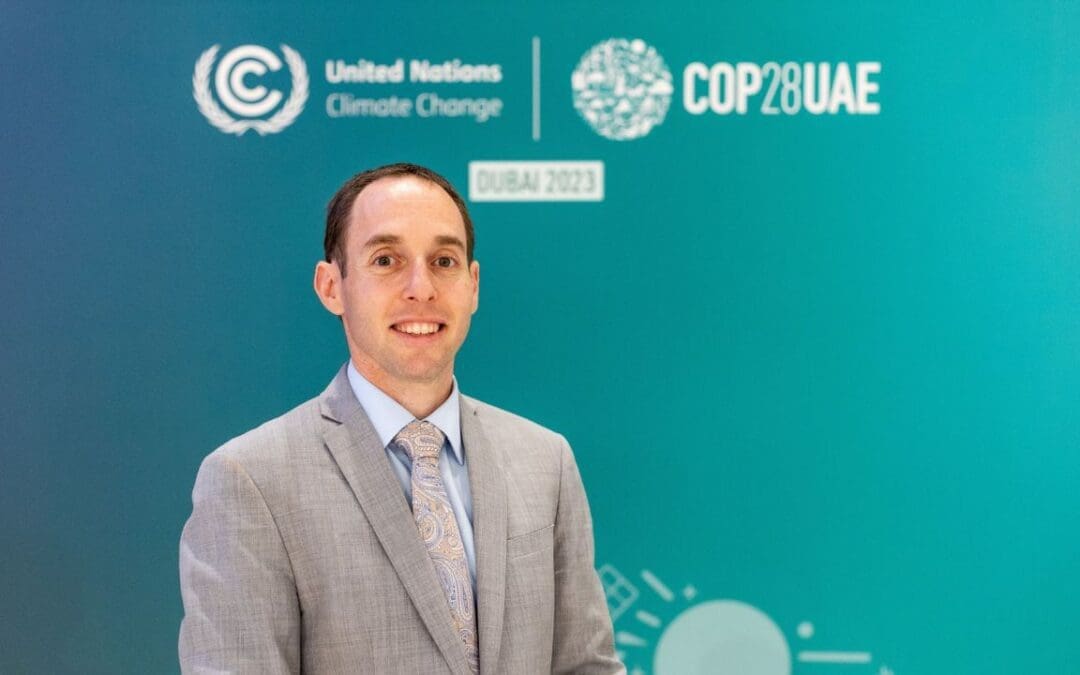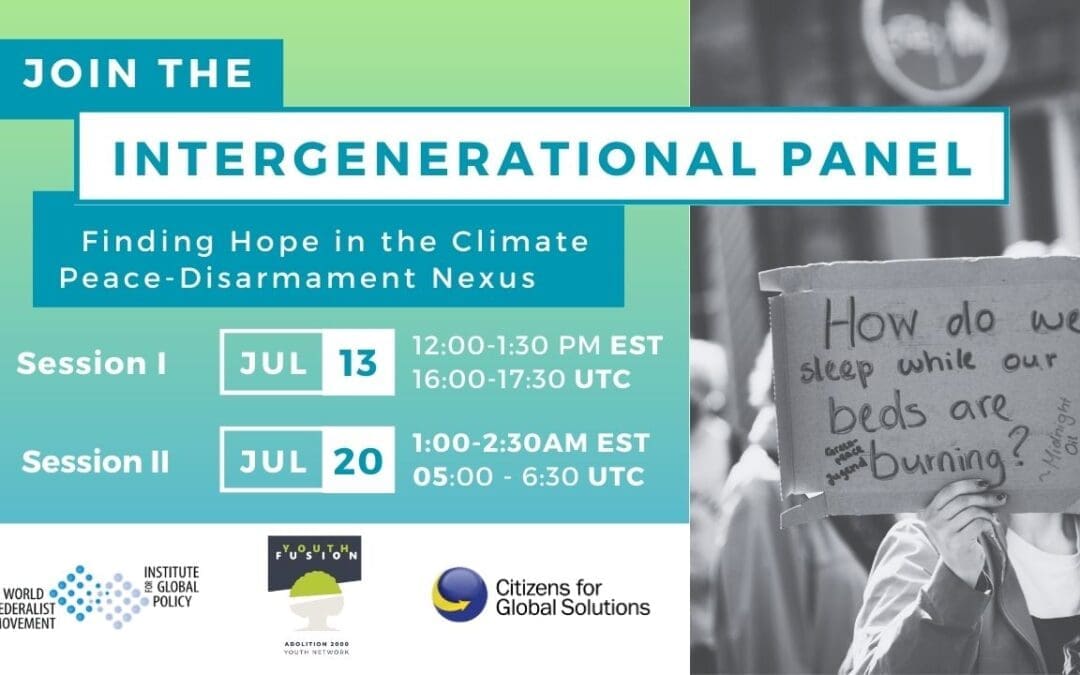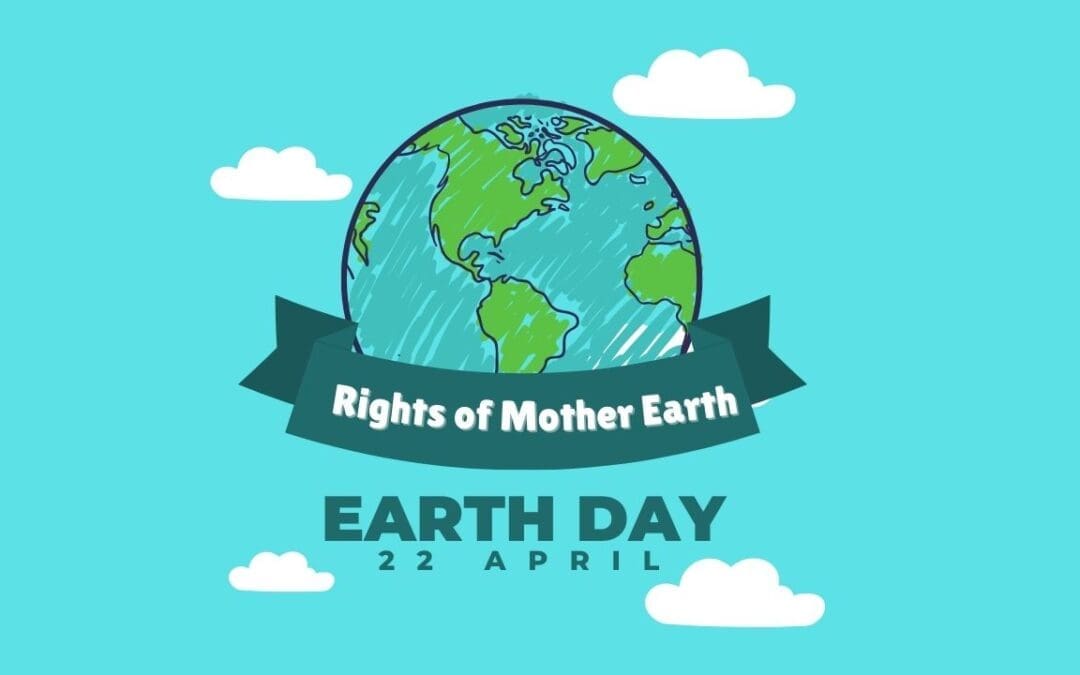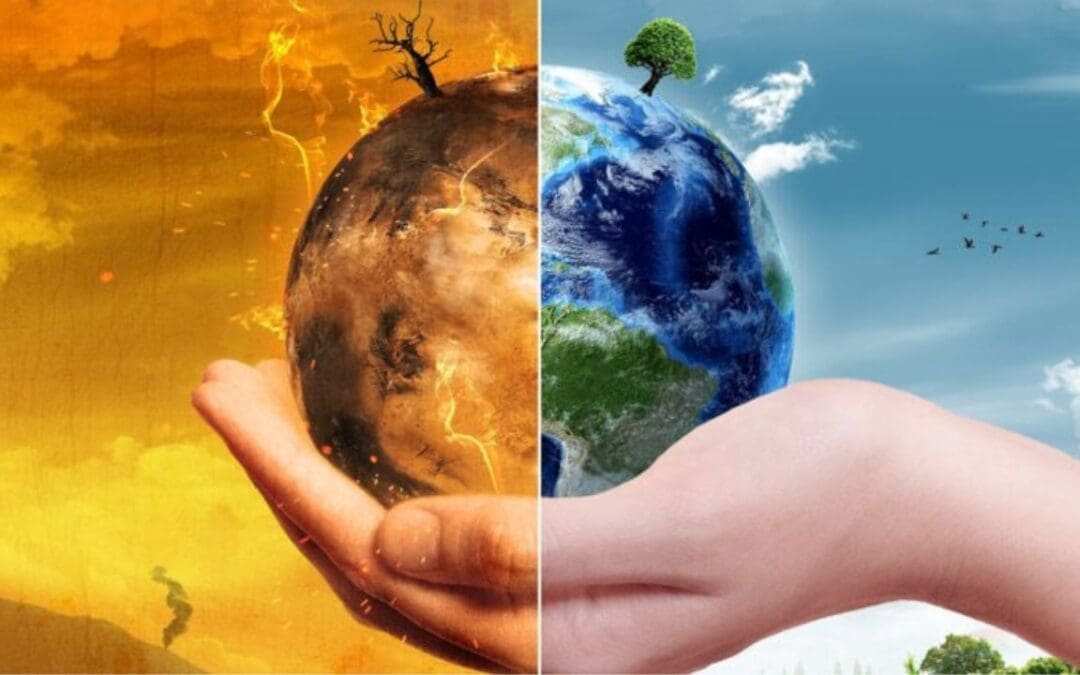
by Daniel Perell | Dec 30, 2023 | Climate Justice
My father was always the smartest person in the room. Despite never studying medicine, he once assisted a pre-med friend in preparing for an exam entirely by recalling intricate anatomical structures from a biology course he had taken thirty years prior.
My father was also a smoker. Some of my earliest memories are my tearful pleas to him to stop, knowing, as we both did, the risks. My dad did the math and determined that he didn’t yet need to change behavior. He would coin clever phrases like “maybe I might” and “I want to want to quit.” This reticence instilled in me, from a very young age, a curiosity about what truly motivates people to change. Is it data? We had that. Is it the cries of children? We had that, too.
As I awoke earlier this week to the news that agreement had been reached in Dubai, I, like many, chose to see hope in this small step. I will work tirelessly to contribute my small portion to this great collective effort to stave off the worst consequences of climate change. Yet a question remains in my mind—to what degree can these agreements bend the curve of our behavior? How can we ensure the trajectory will be meaningfully different with this consensus having been reached?
I look to examples the international community has created to shape the behavior of governments and humanity more broadly. The Security Council, the human rights system, the sustainable development goals. Each has had an impact in its own way. A stronger enforcement mechanism like the Security Council increases legitimacy, but limits consensus. A systematic and mandatory review system, like the Universal Periodic Review, ensures oversight and greater fact-finding, but is dependent on Member State compliance for results. And an entirely voluntary system, like the Sustainable Development Goals, can inspire the masses and allow the tracking of progress. Yet for the SDGs, and based on recent reports, the curve has yet to be bent sufficiently to achieve the prosperity a bright-eyed 2015 international community hoped for.
These are all helpful in their own right. But the forces of inertia are strong. Volition and motivation are needed.
Nowhere is this more relevant than in the case of climate agreements. Many nations which have contributed the least to climate change must respond to consequences not of their making. And those which exercise an outsized influence on the shape and direction of human affairs, for reasons of history and current priorities, are being asked to sacrifice a degree of short-term well-being of their economies for the long-term security of themselves and others. The science is clear; the issue is summoning the will to overcome the uncomfortable to achieve the necessary. In a way, these countries are my brilliant father.
When my dad was diagnosed with pancreatic cancer—the risk of which was increased by his smoking habit—he quit immediately. It was remarkable. But it was too late. He might have gotten cancer anyway, and it isn’t fair to place blame not knowing the alternate reality. But he certainly did not follow the rules of the precautionary principle in his behavior.
I am heartened to know that in communities around the world, action is being taken now to improve humanity’s relationship with the natural world. People are not waiting. Agreements like those reached in Dubai, in Paris, and elsewhere are important. They represent the consensus of governments, and we, as well-wishers of humanity and the planet, should encourage and expect ever higher ambition.
Yet regardless of our opinion of the outcome in 2023, we have a responsibility to continue looking for the stores of motivation and the diversity of options for individuals, institutions, and communities to make the necessary changes in light of the mounting evidence. If any lesson is to be taken from my family, it is that waiting is not a viable option.
This article was originally published in Bahá’í International Community’s blog.
Photo credit: Baha’i International Community

by Citizens for Global Solutions | Jun 4, 2023
An intergenerational dialogue on how global governance solutions can tackle existential threats
Description
This Q&A panel discussion, hosted by Citizens for Global Solutions (CGS), Youth Fusion, and World Federalist Movement – Institute for Global Policy (WFM-IGP), will consider how progress on environmental protection is hampered by armed conflict, nuclear threats, and the massive diversion of resources into weapons and war. In this webinar, we will explore the potential of common security and global governance to foster cooperation to more effectively address climate, peace, and disarmament issues. This intergenerational dialogue will bring together youthful energy and innovation with seasoned expertise and experience, actively engaging our audience to build stronger pathways to a peaceful and sustainable future.
Session I
Region: Americas/Europe/Africa/Middle East
Date: July 13, 2023 | Time: 12:00 PM -1:30 PM EST | 1600 – 1730 UTC | 1700 London | 1800 CET | 1900 Kenya
Register for Session 1 (Zoom)
Session 1 Speakers
- William (Bill) R. Pace (USA). Founder and Inaugural Convenor, Coalition for an International Criminal Court. Former Executive Director, World Federalist Movement-Institute for Global Policy (WFM-IGP). Co-founder, International Coalition for the Responsibility to Protect.
- Kehkashan Basu MSM (UAE/Canada). Founder-President, Green Hope Foundation. United Nations Human Rights Champion. Winner, 2016 International Children’s Peace Prize. Council Member, World Future Council. Former UNEP Global Coordinator for Children & Youth;
- Professor Juergen Scheffran (Germany) Professor of Integrative Geography. Chair of the Research Group Climate Change and Security, Center for Earth System Research and Sustainability, University of Hamburg. Principal author, The Climate-Nuclear Nexus.
- Maja Groff (Netherlands) Convenor, Climate Governance Commission. Visiting Professor/Scholar at Faculty of Governance and Global Affairs, Leiden University. Lecturer, Hague Academy of International Law.
- Additional speakers to be confirmed
Co-Sponsors
3+3 Coalition for a North-East Asia Nuclear-Weapon-Free Zone, Basel Peace Office, Citizens for Global Solutions, Climate Governance Commission, Democracia Global, Global Minnesota, Green Hope Foundation, I Am Climate Justice, Parliamentarians for Nuclear Nonproliferation and Disarmament, World Federalist Movement Institute for Global Policy, World Future Council, World Service Authority, World’s Youth for Climate Justice, Young World Federalists and Youth Fusion.
Promotional Sponsors
Peace Action and Upper Hudson Peace Action.
About the Organizers
Citizens for Global Solutions (CGS) is a non-governmental, non-profit, non-partisan membership-based organization that for more than 75 years has brought together a diverse collective of individuals and organizations with a common goal of a unified world predicated upon peace, human rights, and the rule of law. From championing ratification of the UN Charter upon our establishment in 1947 to supporting creation of the International Criminal Court (ICC) 25 years ago to advocating for global instruments to confront today’s enduring challenges of war and climate degradation, CGS recognizes that true progress is a generational enterprise. We invite like-minded individuals and organizations to join us in this mission.
Youth Fusion
Youth Fusion is a world-wide networking platform for young individuals and organizations in the field of nuclear disarmament, risk-reduction and non-proliferation. We focus on youth action and intergenerational dialogue, building on the links between disarmament, peace, climate action, sustainable development and building back better from the pandemic. Our goals are clear: to inform, educate, connect and engage our fellow students, activists and enthusiasts. Through these activities, and as part of Abolition 2000 Network, we are contributing to the total abolition of nuclear weapons.
World Federalist Movement – Institute for Global Policy (WFM-IGP)
The World Federalist Movement/Institute for Global Policy (WFM/IGP), established in 1947, is a non-profit organization registered in the USA and the Netherlands. Guided by its vision of a just, free, and peaceful world, WFM/IGP works to promote the rule of law and global governance of transnational issues including those related to peace, human rights, and the environment.
Our vision is a just, free, and peaceful world, where humanity and nature flourish in harmony, while our mission is to create more effective, transparent, and accountable global governance leading to democratic world federation.

by Citizens for Global Solutions | Jun 3, 2023
An intergenerational dialogue on how global governance solutions can tackle existential threats
Description
This Q&A panel discussion, hosted by Citizens for Global Solutions (CGS), Youth Fusion, and World Federalist Movement – Institute for Global Policy (WFM-IGP), will consider how progress on environmental protection is hampered by armed conflict, nuclear threats, and the massive diversion of resources into weapons and war. In this webinar, we will explore the potential of common security and global governance to foster cooperation to more effectively address climate, peace, and disarmament issues. This intergenerational dialogue will bring together youthful energy and innovation with seasoned expertise and experience, actively engaging our audience to build stronger pathways to a peaceful and sustainable future.\
Session II
Region: Asia/Pacific
Date: July 20, 2023 | Time: 5:00 AM UTC | 10:30 AM Delhi | 2:00 PM Tokyo | 5:00 PM Wellington | 7:00 PM Hawaii | 7:00 AM Eastern Europe | 1:00 AM EST
Register for Session 2 (Zoom)
Session II Speakers
World Federalist Movement – Institute for Global Policy (WFM-IGP)
The World Federalist Movement/Institute for Global Policy (WFM/IGP), established in 1947, is a non-profit organization registered in the USA and the Netherlands. Guided by its vision of a just, free, and peaceful world, WFM/IGP works to promote the rule of law and global governance of transnational issues including those related to peace, human rights, and the environment.
Our vision is a just, free, and peaceful world, where humanity and nature flourish in harmony, while our mission is to create more effective, transparent, and accountable global governance leading to democratic world federation.
- Nicole Ponce (Philippines) Co-Founder and Coordinator, I am Climate Justice movement.Asia Front Coordinator, World’s Youth for Climate Justice.
- Disha Ravi (India) Co-founder, Fridays for Future India.
- Dr Justin Sobion LLM (Trinidad and Tobago) Legal Researcher and Teaching Assistant, NewZealand Centre for Enviornmental Law, University of Auckland. Coordinator, Earth Trusteeship Working Group. Co-editor, “Reflections on Earth Trusteeship: Mother Earth and a new 21st Century governance paragdigm.”
- Tadashi Inuzuka (Japan) Co-President, World Federalist Movement – Institute for Global Policy. Executive Director, 3+3 Coalition for a North-East Asia Nuclear-Weapon-Free Zone. Former Senator for Nagasaki.
- Augusto Lopez-Claros Executive Director, Global Governance Forum. Senior Fellow at the Edmund Walsh School of Foreign Service at Georgetown University. Former Director of the Global Indicators Group in DEC of the World Bank.
- Additional speakers to be confirmed
Co-Sponsors
3+3 Coalition for a North-East Asia Nuclear-Weapon-Free Zone, Basel Peace Office, Citizens for Global Solutions, Climate Governance Commission, Democracia Global, Global Minnesota, Green Hope Foundation, I Am Climate Justice, Parliamentarians for Nuclear Nonproliferation and Disarmament, World Federalist Movement Institute for Global Policy, World Future Council, World Service Authority, World’s Youth for Climate Justice, Young World Federalists and Youth Fusion.
Promotional Sponsors
Peace Action and Upper Hudson Peace Action.
About the Organizers
Citizens for Global Solutions (CGS) is a non-governmental, non-profit, non-partisan membership-based organization that for more than 75 years has brought together a diverse collective of individuals and organizations with a common goal of a unified world predicated upon peace, human rights, and the rule of law. From championing ratification of the UN Charter upon our establishment in 1947 to supporting creation of the International Criminal Court (ICC) 25 years ago to advocating for global instruments to confront today’s enduring challenges of war and climate degradation, CGS recognizes that true progress is a generational enterprise. We invite like-minded individuals and organizations to join us in this mission.
Youth Fusion
Youth Fusion is a world-wide networking platform for young individuals and organizations in the field of nuclear disarmament, risk-reduction and non-proliferation. We focus on youth action and intergenerational dialogue, building on the links between disarmament, peace, climate action, sustainable development and building back better from the pandemic. Our goals are clear: to inform, educate, connect and engage our fellow students, activists and enthusiasts. Through these activities, and as part of Abolition 2000 Network, we are contributing to the total abolition of nuclear weapons.
World Federalist Movement – Institute for Global Policy (WFM-IGP)
The World Federalist Movement/Institute for Global Policy (WFM/IGP), established in 1947, is a non-profit organization registered in the USA and the Netherlands. Guided by its vision of a just, free, and peaceful world, WFM/IGP works to promote the rule of law and global governance of transnational issues including those related to peace, human rights, and the environment.
Our vision is a just, free, and peaceful world, where humanity and nature flourish in harmony, while our mission is to create more effective, transparent, and accountable global governance leading to democratic world federation.

by Citizens for Global Solutions | Apr 22, 2023 | Organizational Statement
Let this Century be the Century of the Rights of Mother Earth: Strengthening Global Governance is Key to Ensuring a Sustainable Future
Washington, DC- On April 22, Citizens for Global Solutions (CGS) joins the United Nations and civil society throughout the world in celebrating International Mother Earth Day. On April 22, 2009, the Bolivian government proposed a resolution that was adopted by the United Nations General Assembly (UNGA) declaring every April 22 to be International Mother Earth Day. The resolution calls for “acknowledging that the Earth and its ecosystems are our home” and “promot(ing) harmony with nature and the Earth” to adequately address our environmental, economic, and social needs.
Evo Morales, the former President of Bolivia, strongly supported the adoption of this resolution, asserting during a meeting with the UNGA that “the twenty-first century is the century of the rights of Mother Earth and of all living beings.” During his speech, President Morales also stressed the importance of four, critical rights to which Mother Earth and all life on Earth are entitled: the right to life, the right to regenerate its biodiversity, the right to live a clear life (free of pollution and toxins), and the right to “harmony and balance with and among all and everything” (recognizing the interdependence of all life on Earth.) Furthermore, President Morales called for the incorporation of these four principles in the “Universal Declaration of the Rights of Mother Earth,” which was prepared during the World People’s Conference on Climate Change and the Rights of Mother Earth, hosted in Bolivia in 2010.
CGS and Young World Federalists (YWF) unconditionally support the principles and priorities enshrined in the Universal Declaration of the Rights of Mother Earth, and we strongly believe that ensuring a sustainable future for present and future generations can only be achieved by strengthening global governance and international environmental cooperation. Ramesh Thakur, former UN Assistant Secretary-General, argues that the “global governance deficit,” or the lack of global institutions that implement, interpret, and enforce international environmental laws and treaties, is among the factors that impede meaningful international action to address the climate crisis. Furthermore, Thakur asserts that a world order based on absolute national sovereignty- where countries are not held responsible for violating their environmental commitments- is a key cause of this lack of global environmental governance since it encourages political leaders to prioritize their own political interests over the well-being of Mother Earth.
How can we foster international cooperation and bolster global governance to address the climate crisis? One possible path forward is strengthening existing global governance institutions. This includes empowering the UNGA to pass binding international resolutions driving global emissions reduction efforts, particularly on the part of high emitting countries like the US and China.
Another pathway is to support and strengthen international legal institutions’ capacity to hold perpetrators accountable for environmental crimes. The Rome Statute, the foundational treaty of the International Criminal Court (ICC), notably includes environmental destruction within the definition of war crimes [Art 8.2(b)(iv)].Beginning in 2016, the Court announced that it would begin “considering cases involving environmental destruction, misuse of land, and land grabs as crimes against humanity.” The Office of the Prosecutor (OTP) also has communicated its intent “to cooperate and provide assistance to States, upon request, with respect to conduct which constitutes a serious crime under national law, such as . . . destruction of the environment.” Despite these notable steps, there are increasing calls to include “the crime of ecocide” as a stand-alone crime via amendment to the Rome Statute. To this end, the Independent Expert Panel for the Legal Definition of Ecocide, convened by the Stop Ecocide Foundation, formulated a draft definition of the crime, which would place ecocide on equal footing with the four crimes within the Court’s current jurisdiction: genocide, crimes against humanity, war crimes, and the crime of aggression.
Establishing the international crime of ecocide also is a key recommendation of the Environmental Governance track of the Global Futures Forum (GFF), a civil society-led conference last March which convened hundreds of NGOs and individuals from around the world to further civil society and youth input in the Summit of the Future.
An additional environmental governance recommendation from the GFF is to encourage the International Court of Justice (ICJ) to more frequently address environmental issues. While the ICJ has heard cases touching on environmental matters, beginning with the notable Nicaragua v. Costa Rica judgment (holding that Nicaragua had a duty to compensate Costa Rica for “major environmental damages to its territory,” the Court has yet to deploy a powerful potential tool for environmental justice: Currently, the ICJ’s Chamber for Environmental Matters, established in 1993, has still not heard an environmental case due in part to states’ reluctance to classify a dispute as essentially “environmental” in nature.Furthermore, a UNGA resolution last month, sponsored by Vanuatu – an island country that has disproportionately experienced the effects of the climate crisis – could signify a decisive turning point regarding the ICJ’s involvement in environmental matters. Specifically, the resolution empowers the UNGA to seek ICJ adjudication in cases concerning countries’ commitments to address climate change and where countries intentionally or negligently cause environmental degradation that affects other countries’ environmental well-being, especially nations that are most vulnerable to climate change, like island countries.
Promoting meaningful international climate action may also require creating new global governance institutions, such as an International Court for the Environment. Experts have proposed a “Climate Club” that would establish a single international target carbon price and sanction non compliant countries and countries that do not participate. Furthermore, the Environmental Governance track of the GFF called for the establishment of an “Earth Governance Regulatory Body,” which would pursue a global Decarbonization Agenda to promote a just transition to a more sustainable economy.
We at CGS and YWF are confident that the 21st century will be, as Evo Morales declared, “the century of the rights of Mother Earth and of all living beings.” Yet ensuring a sustainable future for all who call Mother Earth their home will require unprecedented, yet necessary, international action to address the climate crisis. And that starts with strengthening global environmental governance.
“Earth Day cannot be a moment for reflection alone. It must compel action. As Wendell Berry cogently stated ‘the Earth is all we have in common.’ It is our shared responsibility as a global family to embrace the theme of 2023 Earth Day and invest in our planet.” – Rebecca A. Shoot, Executive Director, Citizens for Global Solutions (CGS)
About Citizens for Global Solutions & Young World Federalists
Citizens for Global Solutions (CGS) is a non-governmental, non-profit, non-partisan membership-based organization that for more than 75 years has brought together a diverse collective of individuals and organizations with a common goal of a unified world predicated upon peace, human rights, and the rule of law. From championing ratification of the UN Charter upon our establishment in 1947 to supporting creation of the International Criminal Court (ICC) 25 years ago to advocating for global instruments to confront today’s enduring challenges of war and climate degradation, CGS recognizes that true progress is a generational enterprise. We invite like-minded individuals and organizations to join us in this mission.
The Young World Federalists (YWF) are a global movement fighting to give humanity a voice. We envision a sustainable, just, and peaceful world through a democratic world federation. A world run by humanity, for humanity, providing equal opportunity to all on a thriving planet. YWF is currently engaged in a #SaveEarth campaign, which is focused on prosecuting crimes against the environment, taking effective action on climate change, and building a sustainable economy.
Contact: Rebecca Shoot outreach@globalsolutions.org

by Citizens for Global Solutions | Feb 22, 2023 | Climate Justice
When it comes to the climate crisis, we are running out of time.
In 1994, the UN Framework Convention on Climate Change established the Conference of the Parties (COP) to encourage UN member states to meet annually to discuss scientific data and technological advances related to climate change and implement international environmental agreements. Despite the global interest in addressing climate change, the next 29 years would be characterized by lukewarm international efforts to divert a climate catastrophe. In line with this record, the recent COP27 hosted by Egypt failed to secure cooperation on key issues and induce the necessary commitments to reduce greenhouse gas emissions.
One of the earliest international environmental treaties was the Montreal Protocol of 1987. The Montreal Protocol was a success because all 197 UN member states ratified the treaty and it effectively coordinated international efforts to eradicate about 99 percent of ozone-depleting substances (ODS). One major reason behind its success was that it established a “Multilateral Fund” to provide financial backing to countries, especially those who were not meeting their goals. It also prioritized the concept of “common but differentiated responsibilities” by giving developing countries more time to eliminate their production of ODS.
The Kyoto Protocol, which entered into force in 2005, was the first “legally binding” climate treaty that aimed to reduce greenhouse gas emissions. However, it was not successful because the United States never ratified it and China was not required to commit to stringent emissions reduction targets. As this treaty required real economic sacrifices from industrialized countries, it was unable to effectively coordinate international efforts.
The most comprehensive environmental treaty to date was the Paris Agreement of 2015. The Paris Accords required all UN member states to commit to containing average global temperature increases to below 1.5°C above pre-industrial temperatures through setting nationally determined contributions (NDCs). However, this unenforceable agreement was vulnerable to the vicissitudes of domestic politics that led countries to renege on their climate commitments or abandon the treaty altogether, as the United States did under President Donald Trump. Consequently, most climate change experts say that countries’ emissions reduction plans are not sufficient and will not be executed quickly enough to contain temperature increases to 1.5°C.
What lies behind the failure of international climate treaties to secure meaningful action?
One factor is the disagreement between industrialized and developing nations over which should bear most of the burden for reducing greenhouse gas emissions. Wealthy countries like the United States and Britain have contributed the most to cumulative emissions by normalizing environmentally unsustainable overconsumption. Beginning with the Industrial Revolutions, emissions stemming from the manufacturing of goods in European countries, supplied with raw materials from their colonies in Africa, South America, and Asia, skyrocketed. Industrializing countries like China and formerly colonized nations like India argue that, given the economic wealth and technological advancements acquired by others through industrialization and colonization, the wealthiest countries are the best equipped financially and technologically to lead efforts to address the climate crisis. They insist that demands to cut back on their own emissions are unreasonable, given their minor role in causing the current crisis, and that reducing their emissions will temporarily stifle the economic growth that wealthier countries have enjoyed.
Furthermore, the lack of global institutions that enact, interpret, and enforce international environmental laws and treaties seriously hinders coordinated international action. This “global governance deficit” lies at the root of international environmental treaties’ inability to catalyze collective action and hold countries to their climate commitments. A world order based on absolute national sovereignty therefore sacrifices a sustainable world future at the altar of national sovereignty and national political considerations.
To address these challenges, the world urgently needs international legal action that goes beyond the nation-state status quo. The UN General Assembly could be reformed to pass legally binding and enforceable resolutions through a voting process that also takes into account factors like population. The General Assembly could then pass binding resolutions requiring industrialized and high emitting countries like the United States and China to spearhead emissions reduction efforts and establish ecocide law to make environmental destruction an international criminal act, prosecuted by the International Criminal Court. Building an enforcement mechanism into international environmental treaties would mitigate our current climate crisis.
Promoting meaningful international climate action may also require creating new global governance institutions, such as an International Court for the Environment. Experts have proposed a “Climate Club” that would establish a single international target carbon price and sanction noncompliant countries and countries that do not participate.
In today’s warming world, the stakes have never been higher. To prevent an irreversible chain reaction of climate catastrophe, we must marshal our scientific acumen, political will, and technological prowess on a global scale to contain global temperature rise. Doing so will require addressing the politics of climate change policy within and among countries and the current ineffective system of global environmental governance, including its unenforceable international treaties.
The path forward will not be easy, for it will require unprecedented grassroots mobilization and political courage. But the task isn’t impossible. The far-sighted individuals who gathered in San Francisco to create the United Nations knew the difficulties that awaited them, but never surrendered to pessimism, hopelessness, or cowardice. They appreciated that the survival of humankind largely depended on their determination to forge a new path forward for international governance. We must do the same now with respect to the climate crisis, embracing effective global environmental governance and cooperation. The survival of 8 billion humans and all other species on our beloved Earth hinges on our success.



































